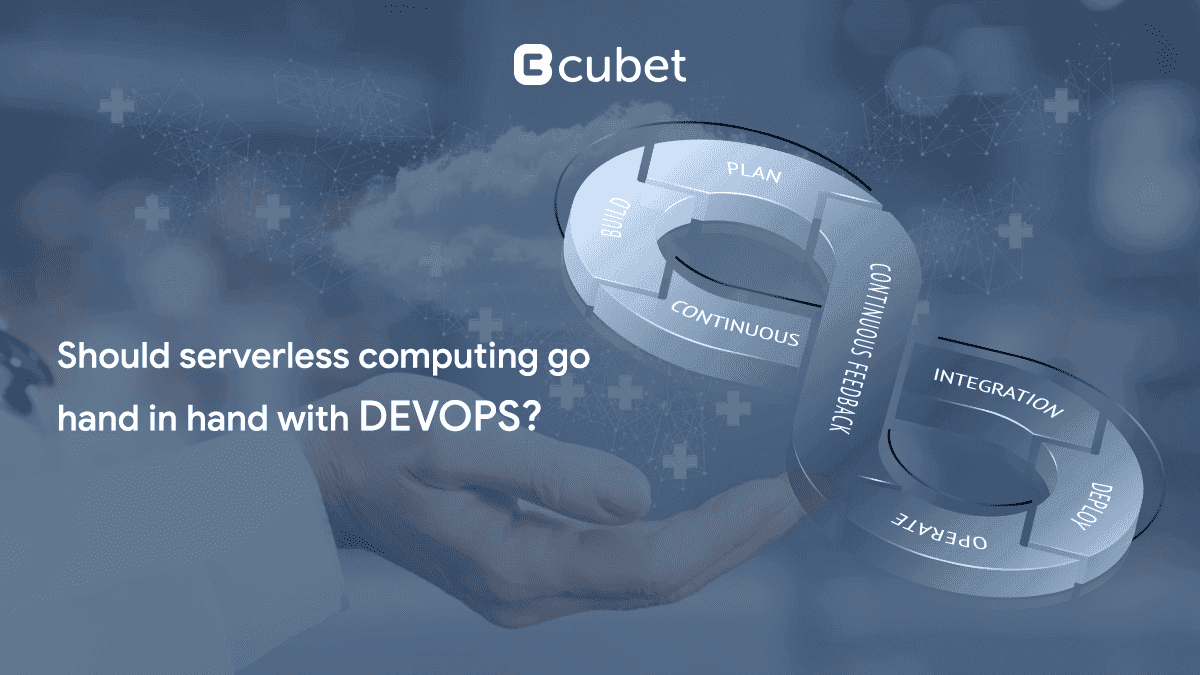Should Serverless Computing Go Hand in Hand With DevOps?

Currently, DevOps has become a buzzword inside the software engineering culture. Some of the major aspects that have steered this trend are the adoption of containers, microservices, and cloud computing. And amongst these, the recent evolution is serverless computing. DevOps has a great impact on the development cycle that includes building, testing, deployment, and monitoring. From the viewpoint of software architecture, DevOps include source control practices playing a crucial role in code sharing and team collaboration.
In addition, soon after Amazon’s AWS Lambda got introduced in 2014, ‘serverless’ gained momentum. Precisely, serverless computing is a code execution model where the cloud provider is completely responsible for hardware management and operating system. Designed to provide a scalable execution architecture with a predictable pricing model, serverless computing majorly simplifies the operations part of DevOps. The platform users pay only for the total amount of resources they used for computing.
Now, all that said, let us know how DevOps relates to serverless computing to a considerable extent. During the migration of apps to serverless platforms, DevOps becomes the most suitable option specifically at the beginning of the adoption process. So how does the whole thing happen?
What Relevance Does DevOps and Serverless Deployment Make to Each Other?
- When it comes to reviewing any serverless function, there are very less chances of segregating development and operations. This requires an operational surrounding right in the cloud. And here, DevOps plays the role. It promotes the combined process of development and operations backed up by serverless deployments.
- With serverless architecture, a meager difference remains between engineers and cloud operational developers. Their roles merge encompassing the core aspect of DevOps. This leads to streamlining of development and operational functions.
- Once migration gets done to a serverless platform successfully, the DevOps team remains at ease with the reduction of lesser workload but server maintenance
- Further, the roles of both teams collapsed leading to the establishment of the core DevOps fundamentals. However, for data and database management, the teams must continue to focus on both aspects namely the application code and the database. If the team fails to do this, scaling the persistence layer becomes difficult with application changes. Hence, this leads to quality issues, data loss, or erroneous database change.
- With serverless architecture, you can implement the entire build, test, and deploy pipeline by creating the glue code. The final infrastructure can be further modified because serverless computing implies that business logic and configurations are stored together in the same repository.
Specific Use Cases of DevOps for Lambda Functions Within AWS.
Authenticated Proxies
For accessing resources in your VPC firewall, you use a Cognito-protected API Gateway endpoint with a Lambda function to proxy requests.
S3 Object Replication
With S3, you can only perform a single replication destination. To replicate the same data to multiple regions, you use Lambda with the S# bucket as an event source
Design and Implementation of DevOps Pipeline
DevOps pipeline guarantees quality codes via build process, QA and deployment automation, monitoring, and source control. When engineers push the code to the GitLab Server, it triggers the GitLab Runner. The GitLab Runner executes CI and CD pipelines consisting of jobs. The Job is the GitLab term describing an activity in a CI/CD pipeline. The jobs run by using Docker containers with a preferred build environment that includes tools such as npm, along with a serverless framework and Node.js. Docker container images are stored in the GitLab Container Registry that remains as a part of GitLab Suite.
Use AWS Lambda with AWS services as Event sources
The source publishes an event triggering Lambda functions. This use case ensures loose coupling between the software components. This is popular in event-driven architectures. Here is one such case, the S3 bucket triggers the Lambda function while file uploading is completed. And now the Lambda function can run some business logic to process uploaded files.
Other Forms of Serverless Computing
Besides the above form of serverless computing, various other forms and categories serve the IT industry such as FaaS (function as a service), Azure Functions, AWS Lambda, Google Cloud Functions, etc. With these providers, the technology has reached a higher platform that goes beyond microservices embracing the power of nano services.
FaaS is a s a form of serverless computing and a category of cloud computing service. This is a comparatively recent development in the arena of cloud development and was first made known in 2014.
AWS Lambda is like a computer service running your code according to events, minus the hassles of provisioning or managing servers. You only pay for the computer time when the code runs.
Microsoft Azure enables developers to write the bare minimum code while stopping bothering about common problems.
Google Cloud Functions is at the forefront of ‘serverless’ options way back since 2008 via its Google app engine. The open beta version of Google Cloud Functions is pretty new, launched in March 2017 supporting an event-driven approach, where you can trigger functions when it is supposed to happen, within the cloud environment.
Serverless and DevOps Are Inseparable And Are Doing Great!
Serverless and DevOps go hand in hand doing wonders for any sort of organization. They complement each other and make an impact like no other duo organization can together. This combination can make your deployment simple, enables quick delivery, and works more efficiently. Lastly, serverless DevOps together redefine the way IT organizations are operated. The combination is heading towards rapid delivery of business values and continuous improvement and learning.
With DevOps, serverless computing works wonders. It introduces you to a wide range of applications rapidly but at low costs and the complexity of architecture. Developers depend on it for various functions offering several unique features.